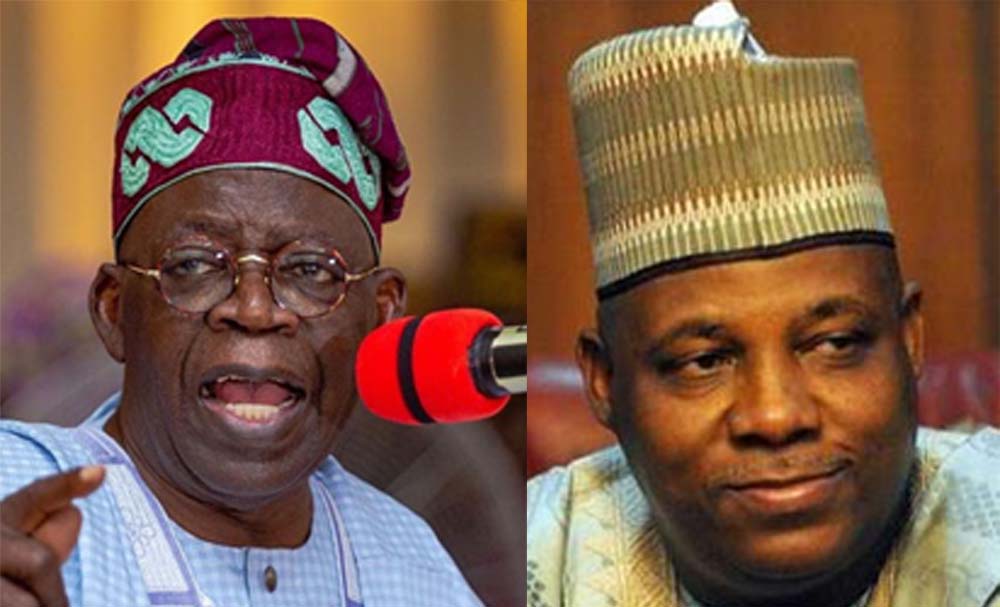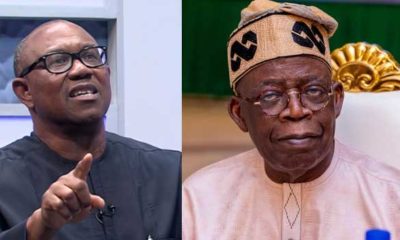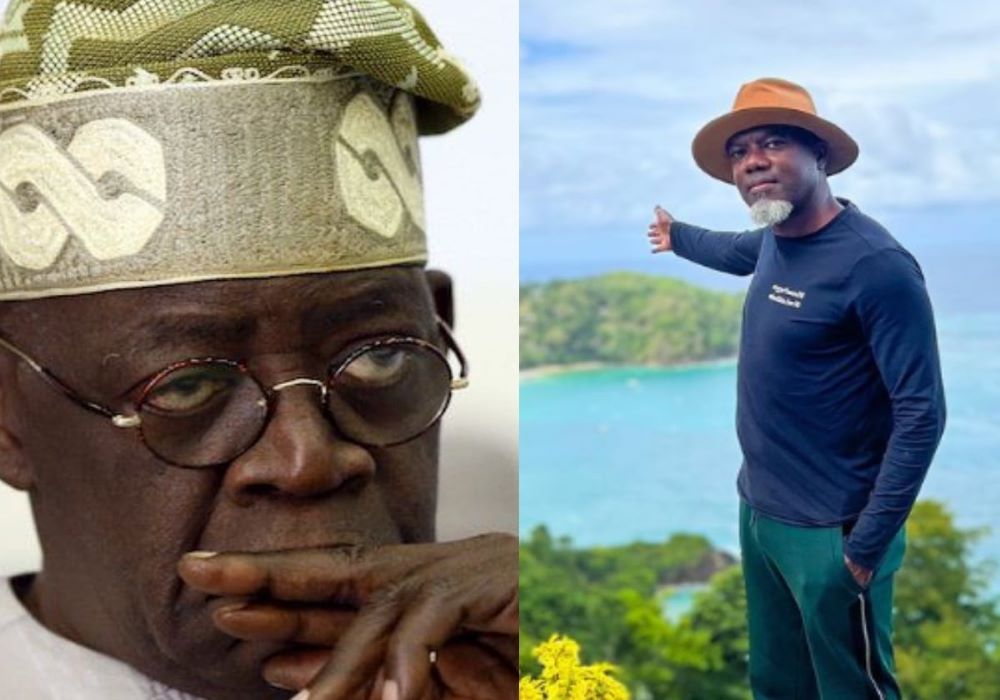Politics
Finally Tinubu settles for Kashim Shettima as APC Vice Presidential candidate

By John Danjuma
All Progressives Congress (APC) Presidential Candidate and National Leader, Asiwaju Bola Ahmed Tinubu on Sunday picked Senator Kashim Shettima as his Vice Presidential candidate.
Tinubu made the disclosure to journalists at the Daura residence of President Muhammadu Buhari.
A statement by Director, Media and Communication, Tinubu Campaign Organisation Bayo Onanuga indicated that the APC touche bearer arrived Daura Sunday afternoon to pay Sallah homage to President Buhari who is in his native home for the Sallah holiday.
The statement explained that the vice presidential candidate Senator Shettima is the immediate past Governor of Borno State and also close associate of Tinubu who has been a staunch supporter and campaigner for the choice of Tinubu as the next President of Nigeria.
He toured many states with Tinubu since December 2021 where he addressed party delegates and mobilised support for the former Governor of Lagos State.
Earlier, the Katsina State Governor Ibrahim Masari, had withdrawn from the 2023 presidential race as running mate to the APC candidate.
Before his withdrawal, Masari was nominated as ‘placeholder’ running mate to Tinubu in order to allow the latter ample time to eventually nominate the right running mate for the 2023 presidential election.
In a statement signed by Masari and issued from Saudi Arabia on Sunday, titled, ‘Resignation As APC Vice Presidential Nominee’, he said he was stepping down “after much reflection and wider consultations.”
Who is Senator Shettima?
As governor of Borno State between 2011 and 2019, the 56 year old Kashim Ibrahim Shettima ran his government on the similar template used by Bola Tinubu in Lagos.
Despite the Boko Haram insurgency, he was able to build world class schools, housing and he also tapped in Human Resources outside his state.
Among his closest aides were an Ibo Christian from Anambra State in the Southeast, an Urhobo Christian from Delta State in the South-South, a Christian from Edo State in the South-South, a Yoruba Christian from the Southwest, a Fulani man from Gombe in the northeast and a Hausa man from Zamfara State in the northwest.
He was born on the 2 September, 1966 to the family of Sir Kashim Ibrahim. He is married to Nana Shettima, and they have three children: two females and a male.
In a Wikipedia biography, Sen. Kashim attended Lamisula Primary School in Maiduguri from 1972 to 1978; Government Community Secondary School, Biu in southern part of Borno State from 1978 to 1980; transferred to Government Science Secondary School, Potiskum (now in neighbouring Yobe State) where he completed his secondary education in 1983. He studied at the University of Maiduguri and earned a Degree (BSc) in Agricultural Economics in 1989. He had his one-year compulsory membership of the National Youths Service Corps, NYSC, at the defunct Nigerian Agricultural Cooperative Bank, Calabar, capital of Cross River State in South-South, Nigeria, from 1989 to 1990.
READ ALSO: Group charges Fani-Kayode to proffer solutions and not incitement on insecurity
He obtained a master’s degree (MSc) in Agricultural Economics in 1991 at the University of Ibadan in Southwest, Nigeria. Shettima joined the University of Maiduguri as a Lecturer with the Department of Agricultural Economics and was in the academia from 1991 to 1993.
Early career:
In 1993, he moved into the banking sector and was employed by (now defunct) Commercial Bank of Africa Limited as head of accounts unit at the bank’s office in Ikeja, Lagos State, Southwest, Nigeria.
Shettima was there from 1993 to 1997. In 1997 he crossed over to the African International Bank Limited as a Deputy Manager and rose to become a Manager in 2001. In 2001, he moved to the Zenith Bank as head of its main branch in Maiduguri. At the Zenith Bank he rose to Senior Manager/Branch Head; Assistant General Manager (AGM)/Zonal Head (North-East), Deputy General Manager/Zonal Head (North-East) before he stepped out of the Zenith Bank as a General Manager in 2007 following his appointment as Commissioner for Finance in Borno State.
Shettima worked with the Commercial Bank of Africa as an Agricultural Economist at its Ikeja Office, Lagos State (1993-1997). He then became a deputy manager, later manager, at the African International Bank Limited, Kaduna Branch (1997–2001), and was appointed Deputy Manager/Branch Head of the Zenith Bank’s Maiduguri Office in 2001, becoming General Manager five years later. In mid-2007, Shettima was appointed Commissioner of the Borno State Ministry of Finance and Economic Development. Later he became Commissioner in the Ministries of Local Governments and Chieftaincy Affairs, Education, Agriculture and later Health under his predecessor as Borno Governor Ali Modu Sheriff.
Political career:
From 2007 to 2011, he served as Commissioner in 5 Ministries. In the January 2011 ANPP primaries, Engineer Modu Fannami Gubio was selected as candidate for the governorship. However, Gubio was later shot dead by gunmen, and Shettima was selected in a second primary in February 2011.
In the 26 April 2011 elections, Shettima won with 531,147 votes while the People’s Democratic Party (PDP) candidate, Muhammed Goni, gained 450,140 votes.
He won reelection in 2015 under the All Progressives Congress, APC and was unambiguously chosen as Chairman of the Northern States Governors’ Forum, an umbrella body of Governors in the 19 States located in northern Nigeria. He has so far been driving key changes in the affairs of the forum with focus on promoting northern unity and reviving ailing industries belonging to northern States.
As Governor of Borno State, he efficiently managed challenges arising from the Boko Haram insurgency which he inherited in 2011. With the approval of the National Security Adviser and the Nigerian Army in 2013, his government formalised establishment of youth volunteers called the Civilian JTF.
Senator Kashim Shettima’s leadership credentials have attracted positive recognition within and outside Nigeria. Governor Shettima emerged the 2014 Governor of the Year (Leadership Newspapers), Governor of the Year, 2015, (Nigeria Union of Journalists, national body); Governor of the Year, 2015 (NewsWatchTimes Newspapers); Governor of the Year, 2015 (Vanguard Newspapers); Governor of the Year, 2016 (Tell Magazine); 2017 Zik Prize for Leadership; Kaduna NUJ Award for courage and exceptional leadership (2017), FCT NUJ Merit Award for exceptional Leadership, 2017.
In February, 2019 he became the winner of the Borno Central Senatorial District election, thereby replacing Senator Babakaka Bashir.
Borno Central Senatorial District comprises eight local government areas: Maiduguri, Jere, Konduga, Bama, Mafa, Dikwa, Ngala and Kala Balge.
Politics
JUST IN: Court Nullifies Removal Of Lagos Assembly Speaker Obasa
The Lagos State High Court sitting in Ikeja has declared the removal of the reinstated Speaker of the State House of Assembly, Mudashiru Obasa, as illegal, unconstitutional, null, and void.
Delivering judgment on Wednesday, the court also set aside all proceedings and resolutions passed by the House on January 13, 2025, the day Obasa was removed from office.
Obasa had dragged the Lagos State House of Assembly and Mojisola Meranda — who was appointed Speaker following his removal — before the court, challenging the legality of the action.
READ MORE: Court Adjourns Obasa’s Suit Challenging Removal As Lagos Speaker To March 10
In its ruling, the court held that the process leading to Obasa’s removal did not comply with constitutional provisions, rendering the exercise invalid.
The judgment effectively reinstates Obasa as the legitimate Speaker of the Lagos State House of Assembly, while invalidating all legislative actions carried out during Meranda’s brief tenure.
Politics
2027: Okpebholo Banks On Edo, Delta States To Swing Tinubu’s Reelection

With permutations for 2027 elections already play high on the cards of Nigerian politicians, Edo State Governor, Senator Monday Okpebholo is banking on Edo and Delta States to team up and swing victory for President Bola Ahmed Tinubu’s re-election.
Biztellers reports that his calculation is informed by the massive defection of notable politicians into the ruling All Progressives Congress (APC) in both States.
Gov Okpebholo made the assertion while welcoming the Chairman of the Niger Delta Development Commission (NDDC), Chiedu Ebie, who led the members of the Unity Group to join the APC.
Notable among other party stalwarts at the occasion were the National Chairman of the APC, Abdullahi Ganduje and the party’s South-South leaders.
ALSO READ: Oyo Police Arrest Three Over Hijacking Of Petrol-Laden Truck
According to Okpebholo “just like Edo, Delta is ready to witness practical governance under APC.”
Beaming with joy, Gov Okpebholo added, “It is our turn to shine in the South South. It is now your turn in Delta. It is happening here, as it happened in Edo State. President Bola Ahmed Tinubu is doing very well for the nation. He is repairing the foundation of the country for better prosperity. Because of that, in Edo State, we have started. We said 2027 is already possible. It is also possible here in Delta. I am here to welcome my brother, Chiedu Ebie.
“Chiedu is an intelligent young man who knows when to move. It is time for Delta to move, and it is starting here with Ika people.”
Receiving the decampees, Alh Ganduje, described the Delta Unity Group as great fighters of democracy, who have provided a strong vehicle that will lead APC to the Delta State Government House in 2027.
According to the APC national Chairman, “we have the three Senators now. We have members of the House of Representatives and State Assembly members, and over 60 percent of the followers of PDP have now joined the APC. We are assured of taking over this State come next election.
“We are not surprised because of the timber and caliber of politicians you have in Delta State in the APC. What we require now is unity. Unity of purpose and unity to win election. So we can provide quality governance to the people of Delta State.
“Very soon, we will organize a stakeholders meeting for all those major stakeholders because they are all good people. They are all wise people. They are all intelligent people, and they are all democrats. So, all of them will be convened for unity, like the Delta Unity Group.”
On his part, the Chairman of the NDDC Governing Board, Ebie, noted that their conviction to join the party was borne out of the love for good governance and party inclusiveness which the President Bola Ahmed Tinubu has demonstrated.
Earlier, while at the Palace of the Dein of Agbor, Dr Benjamin Ikenchukwu, the Keagborekuzi the first, called on President Bola Ahmed Tinubu to ensure peace and security across the country for the needed development in the country.
Present at the rally were Senator representing Delta North, Ned Nwoko; Chairman House Committee on NDDC, Hon. Teke Ibori-Swenu; former Deputy Senate President, Omo Agege, among other party big wigs.
Politics
Okpebholo Excites Edo Workers With Welfare Package

Edo State Governor, Senator Monday Okpebholo has assured that his administration would do everything within its powers to take care of Edo State civil servants and make them happy.
He made the pledge on Friday when he received Executives of Nigerian Labour Congress (NLC), Edo State Chapter, led by its Acting State Chairman, Comrade Bernard Egwekhide.
Egwekhide said they were in Government House to congratulate the Governor on his recent victory at the governorship election tribunal that affirmed his victory in the September 21, 2024 governorship election.
On his part, the Governor said whatever Edo State workers are enjoying in the state is the responsibility of his administration to do because it is worker friendly.
ALSO READ: Uromi Killings: FG, Edo State Set Up Fact-Finding Committee
Okpebholo said, “Whatever we are doing, which is favouring Edo workers, is done because it is our responsibility as a government. Edo people voted for us to work for them, and that is what we are doing to ensure life is made better for our people, including the workers.
“We embrace transparency in all what we do as a government to enable the people to trust us as we are not afraid of criticism. Positive criticism will put us on our toes to work harder for Edo people.
“The renewed hope agenda of the president has given us room and platform to perform and serve Edo people better as we embark on practical governance.
“We are doing everything in the State to ensure peace, unity, growth, and development. That is why we ensure smooth collaboration amongst the three tires of government. In all we do in the State, we ensure the three Senatorial zones are carried along.”
The NLC acting chairman, Egwekhide, commended the Governor for his developmental strides and the friendly environment created for Edo State workers to operate.
He said the visit was necessary as the body had come to congratulate the Governor for his deserved victory at the election petition tribunal in Abuja.
According to him, “Workers in Edo State are proud of you for the developmental strides in the State. You have created a friendly relationship between your administration and Edo workers as you have always taken steps to favour Edo State workers.
“Without asking, workers received their 13th month. You raised the subvention of Ambrose Ali University (AAU) from N41 to N500 million. You regularized casual workers in Edo State. You increased what is due pensioners monthly from N50 million to N1 billion naira for both local and State pensioners.”
He noted that a committee has been set up to look into the compulsory pension scheme, which has become a burden on retired civil servants, adding that the report will be submitted to him for his action.
“We thank the governor for several employments given to our people in the very short time in office,” he added.
In a related development, Gov Monday Okpebholo also received the new branch controller, Central Bank of Nigeria (CBN), Edo State, Apanke Utande who was on a courtesy visit to Government House, where the Governor urged him to collaborate with his administration to improve the lives of Edo people.
















